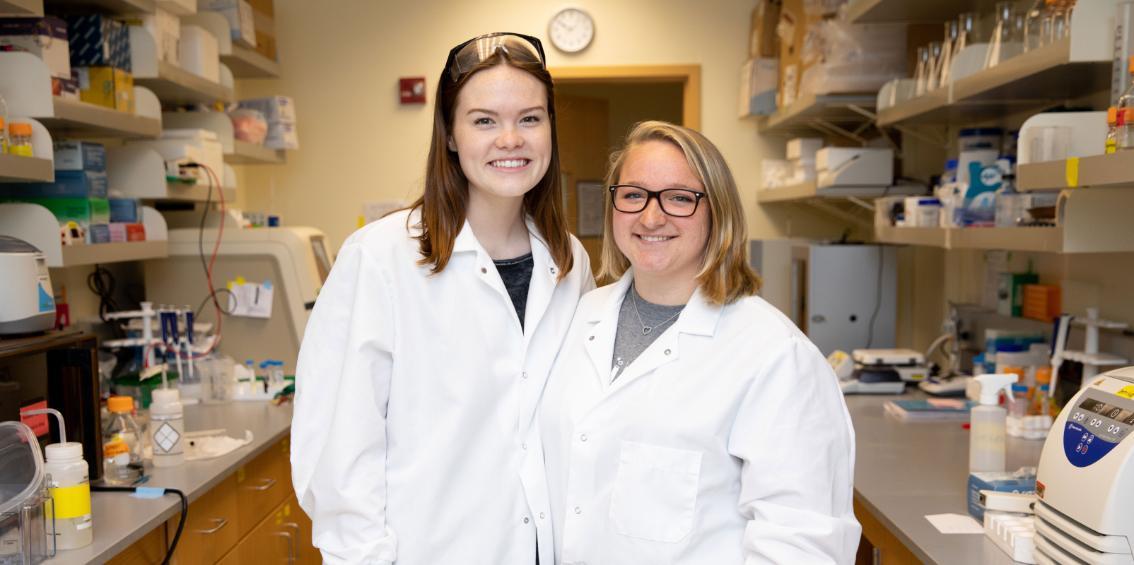Any oncologist will tell you that catching cancer early is the best chance to fight and beat the disease. Often the groundwork for early detection is laid in the research lab.
This summer, two rising Longwood seniors, Meghan Hall '20 and Caitlin Harris '20, both biology majors with chemistry minors, worked with their mentor, Dr. Erin Shanle, assistant professor of biology, to study genetic mutations that have the potential to cause cancer. The goal: to help create screening methods that can identify potentially harmful mutations, giving doctors a better tool to help patients.
For Caitlin Harris, this marks her second summer in PRISM, Longwood’s signature paid summer research program. She was also one of Longwood’s nominees for the prestigious Barry Goldwater Scholarship, the nation’s top STEM scholarship for undergraduates. This is Hall’s first summer engaged in intense summer research. We caught up with them in the lab.
What are you doing this summer?
MH: I’m looking at a specific protein called P300, and we’re looking at certain cancer mutations in that protein and how they affect gene expression. We’re mutating the protein in the lab and putting the mutations into cells and observing how they do. So in the lab every day I’m making mutations.
CH: It was tough going for me early on in the summer. Meghan was pumping mutations left and right, but my protein just didn’t want to mutate.
MH: It’s weird because you’re working with these tubes of clear liquid, and you don’t really know what you’ve got until you have the DNA sequenced.
CH: It’s like a guessing game.
What is the end result? What are you hoping to achieve?
CH: For my project, the bigger picture is creating a screening method to look at which cancer mutations could be the problematic ones. So you have cancer mutations that are considered “passenger mutations,” meaning you can get them and nothing happens with them, and there’s another category called “driver mutations,” which really develop the cancer. If we can pick out the mutations that are problematic, we can catch cancer early.
MH: Mine is very similar. I’m looking for information on my specific protein so we can determine which mutations have the potential to cause tumors.
Meghan how did you first get involved in PRISM?
MH: Dr. Shanle teaches an introduction to cell biology and genetics, and I really loved it, so I reached out to her and asked how I could do some research with her. We started meeting and reading papers and talking about her research. At the same time, I took another genetics class and started to realize that I wanted to be in this field of biology. Then Dr. Shanle suggested I apply for PRISM, and here I am!
Caitlin this is your second year. How is it different?
CH: I feel like this is going a lot quicker. Last year I needed a lot more hands-on help from Dr. Shanle, but this year she knows I’m going to do it right. And this year I’m working with yeast cells, which are pretty resilient.
What are your long-term career plans?
MH: I want to go to grad school. I really like the work I’m doing here and want to continue studying cancer.
CH: I should know by now. I know I want to do research and be in a lab. I wish Longwood had a Ph.D. program because I’d love to stay here!
What would you be doing this summer if you weren’t on campus?
MH: I’d be home in Colorado working somewhere and hiking a lot. But I’m really glad to be here.
CH: I’d probably be working with my dad at home, but I like this a lot better.
What’s your favorite thing to do in Farmville?
MH: This.
CH: Go eat. I like Macado’s and Fishin’ Pig.
Favorite thing to eat at D-Hall?
CH: When I make my own sandwich.
MH: I like the pasta station.
CH: Yeah, the pasta station is good.



Leave a Comment